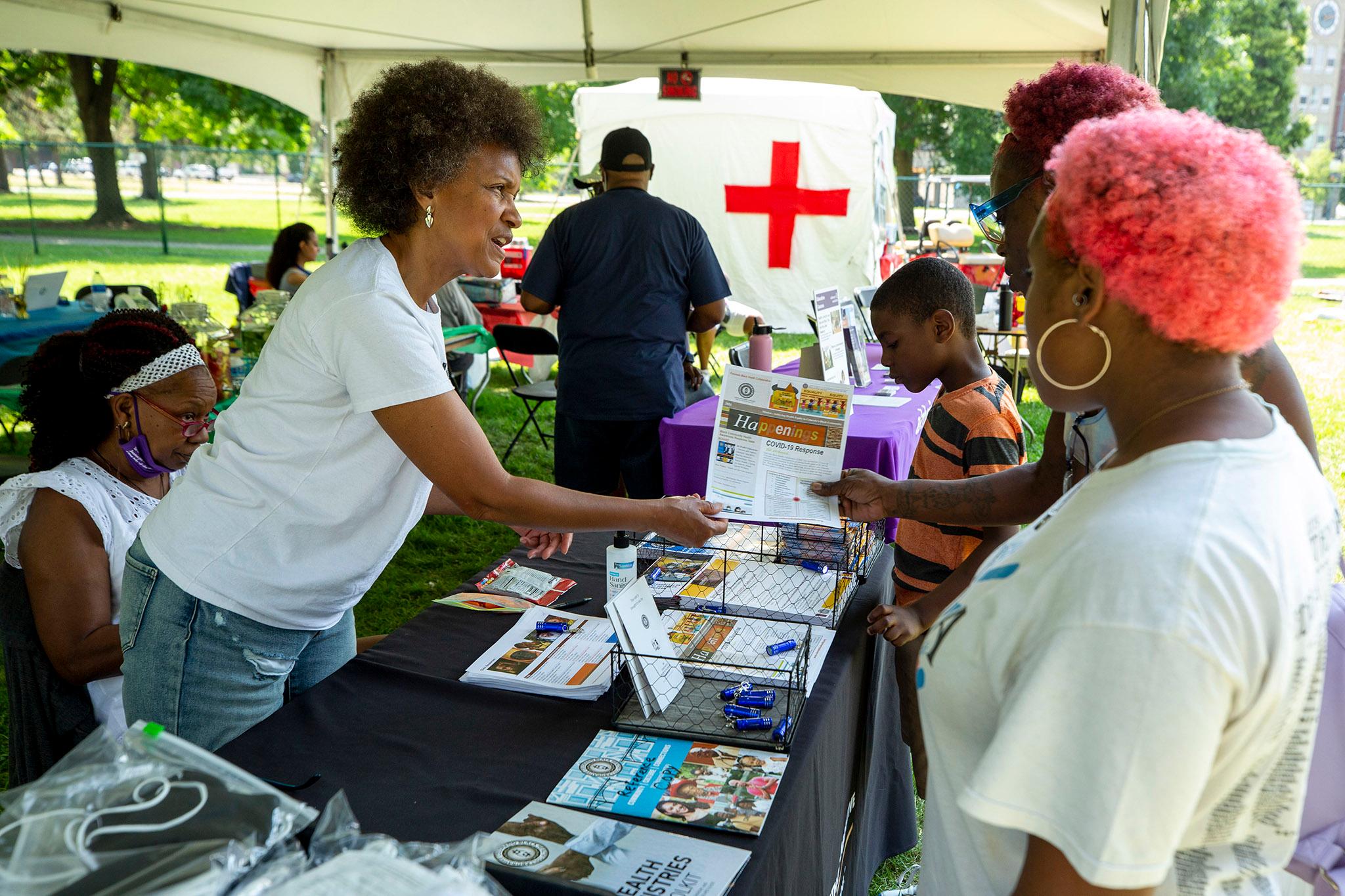
On a hot, sunny Friday afternoon in Denver’s City Park, thousands mingle through booths of paintings, fabrics, and jewelry at the Black Arts Festival. And there’s a section called the “health highway.”
That’s where the charismatic Dr. Terri Richardson has set up shop. In a white T-shirt and blue jeans, she described the wealth of resources at her booth: a directory of providers, flyers about the risks of menthol, and protection from a certain high-profile virus.
“We’ve got masks. Even though some people think the pandemic is over, it’s still here,” she said.
The masks read “In this together.” And that may as well be the motto for the folks behind the booth, the non-profit Colorado Black Health Collaborative. Richardson, who is 63, is one of its founders and she talked about vaccines with patrons of the arts festival.
“I don't try to force people to get a vaccine, but I try to encourage people,” she told a woman named Tara Davis, who replied, “I just ain’t there yet.”
So Richardson just delved deeper.
“So why aren't you there yet? What's going on with you?”
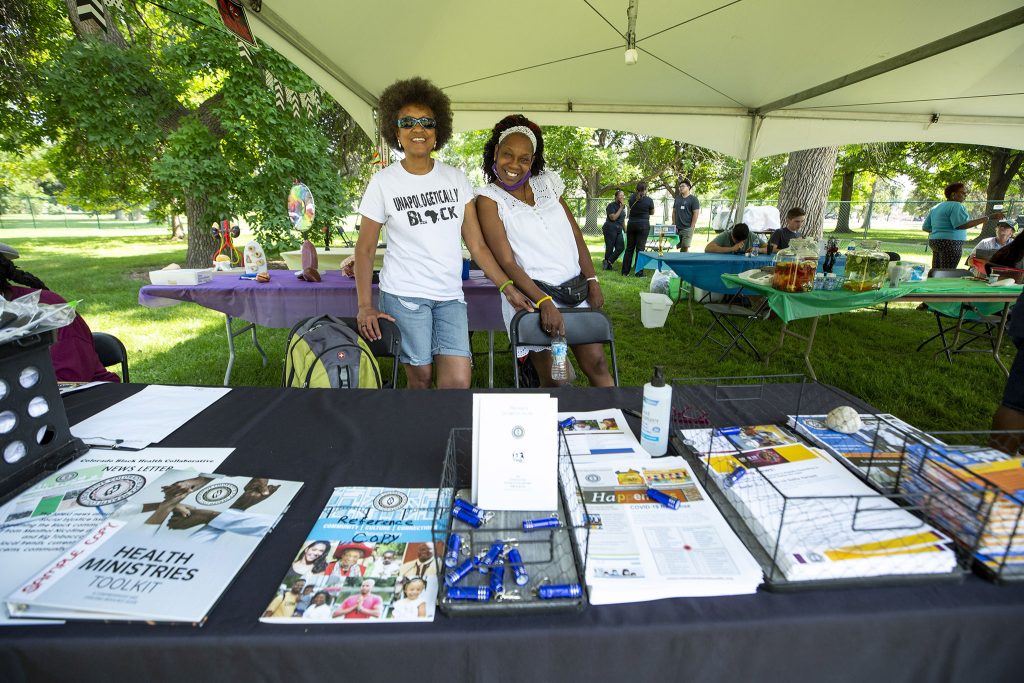
Richardson has just retired after a 34-year career as an internist and primary care physician serving some of the state’s most diverse populations, most recently with Kaiser Permanente. Now she is volunteering her time at events like the art fair in City Park.
“I'm going to continue to work as long as I can. When I say work, I mean, right now volunteering is my work,” Richardson said.
Among the programs she has created is an innovative health outreach program she pioneered that brought vital health resources to barbershops and salons.
At one of them, Winning Coiffures on east Colfax Avenue in Denver, owner Rosalyn Redwine took a break from styling the hair of elderly Denverites to sing Richardson’s praises.
“Well, I believe with what she does and coming out to the community, not behind her desk and not behind the Kaiser doors, but she's out in the community. I believe she's leaving an impression on a lot of people,” said Redwine, adding Richardson had surely left an “impression on my life.”
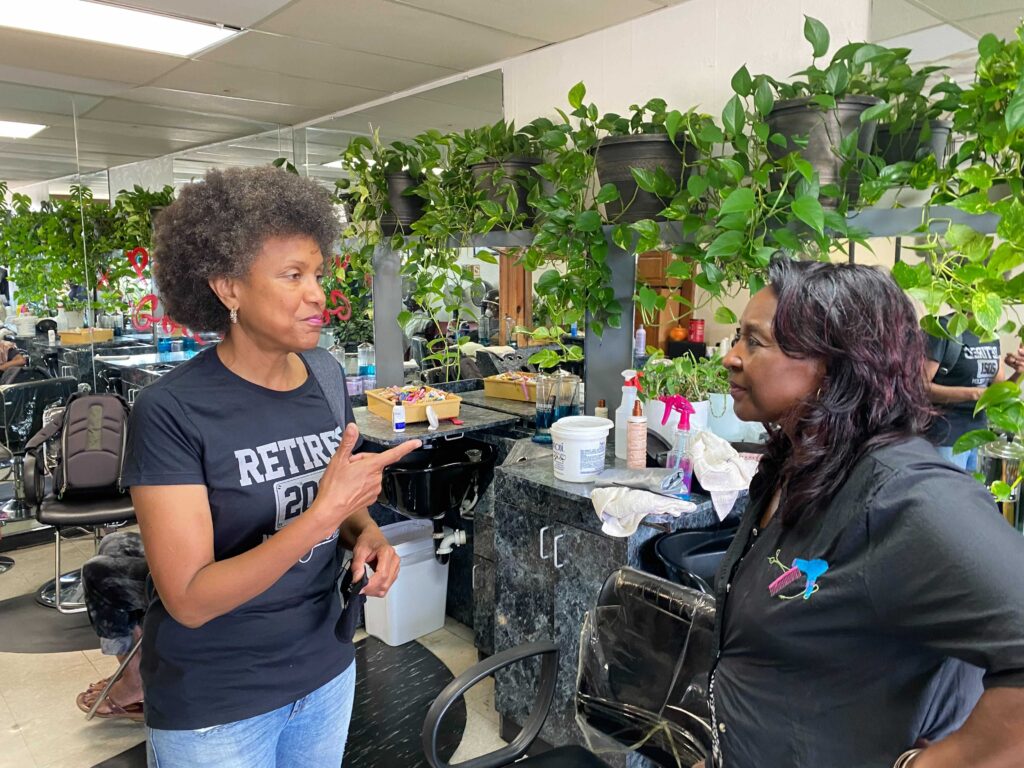
Volunteers from the collaborative, like Richardson, come to shops with free health educational materials, diabetes screening, HIV testing and blood pressure screening, which once helped Redwine.
“I believe that it saved my life. Yes I do.” Richardson said Redwine learned of a dangerous but treatable kidney problem. “Her blood pressure really was high and it was related to the kidney disease,” she said.
“We were just here to kind of serve the community,” said Richardson. The group has done 8,600 screenings over the last decade, she said.
Richardson’s career helping people started in Denver. She grew up, one of six kids, in the northeast part of the city, where her dad was a longtime, well-known director of the East Denver YMCA. Her mom was an educator, at one time teaching now Denver Mayor Michael Hancock.
She attended George Washington High, where she excelled at school. Following in the footsteps of a Black woman student a year ahead of her, she applied and got into Stanford.
“But I heard a lot of comments from some of my white classmates that I took this person's spot and that person's spot,” Richardson said, calling that reaction from school friends upsetting. “My academics were great. So it really wasn't like, I was just doing affirmative action, that’s what they were implying.”
At Stanford she thrived, took science classes and then went to Yale Medical School before coming back to a medical residency at Denver Health. And she found her life’s mission treating a diverse pool of patients in a clinic downtown, known as Eastside.
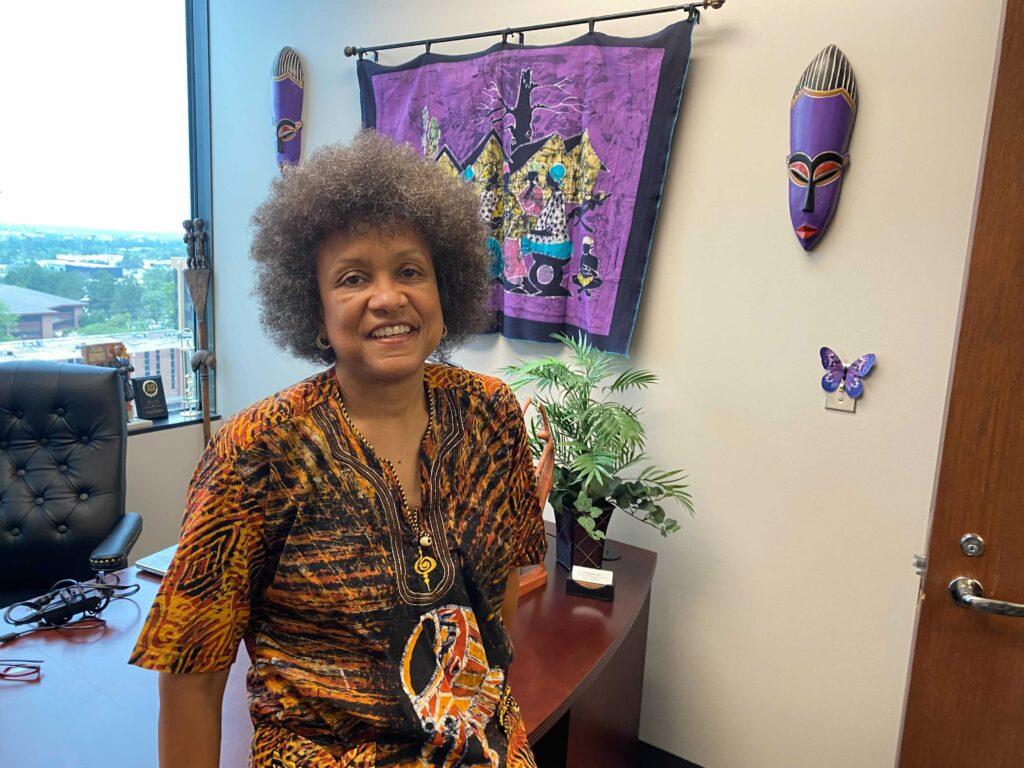
“And I remember my mom telling me that a guy she knew said, ‘Why is your daughter working down there at that clinic? She's been to all these top schools and she's working down there at a ghetto clinic,’ “ Richardson recalled. “And my mom says, that's what she wants to do. And she left it at that.”
Richardson bonded with her patients, making the occasional unofficial house call or giving a patient a ride home.
“You know I gave some people a ride. They’re like ‘I gotta get on the bus’ and I was like ‘you can barely stand, you know,” Richardson said. “I’ll give you a ride home and then I’ll check in with you tomorrow.’ It was kind of like old-fashioned doctoring.”
It was also the start of a lifelong approach to medicine as public service.
“Once I started working there, then I knew for sure that this is my next chapter in my life, to give back to the community in this way,” she said. “I mean, my family was always involved in the community, even growing up. It's kind of, part of our value is to give to your community.”
Later she moved to Kaiser’s East Denver office. One colleague, Dr. Hanah Polotsky, says it was known as the United Nations clinic. It had perhaps the most diverse patient population--and staff, something for which Richardson vocally advocated.
“And that’s one of the things Terri always told us, ‘Your doctors and your staff need to look like your patients,’” Polotsky said.
“She was instrumental in bringing the health equity piece to Kaiser Permanente around the African-American community and the Latino community,” said Jerome Blackwell, a clinical lab manager and another longtime Kaiser colleague. “She was really on the forefront of pushing, saying, Hey, what about our communities? How are we being affected? How is Kaiser addressing some of those gaps, those care gaps?
As one of the few African-American providers within Kaiser Colorado, “it was critical to have that voice,” he said.
But as Richardson wraps up her long career, the number of women, Black and Hispanic doctors in Colorado still lags behind their share of the population.
Black women represent almost two percent of Coloradans, but less than one percent of all Colorado physicians. And those numbers haven’t changed much over the last two decades.
“Colorado is not too dissimilar to the rest of the U.S. in terms of its slow progress in diversifying its physician workforce,” said Dr. Dan Ly, with the UCLA David Geffen School of Medicine. Studies have shown nationally Black, Hispanic and American Indian doctors are all underrepresented compared to their share of the population.
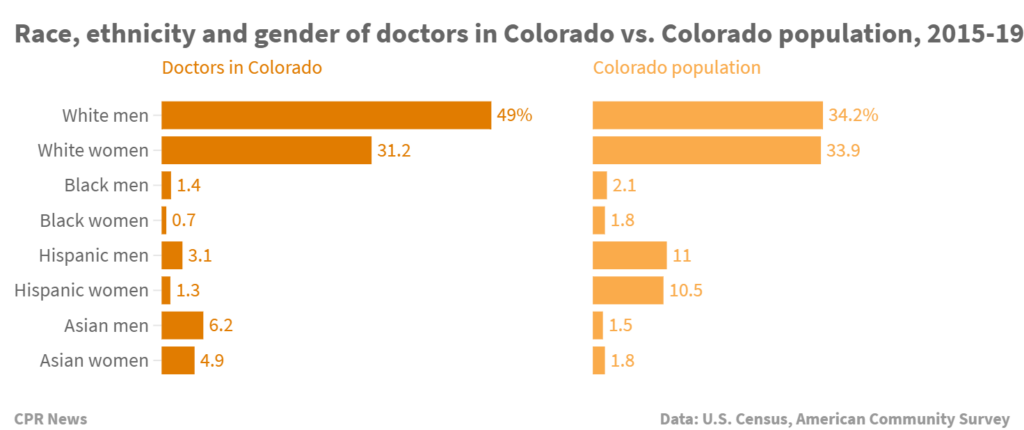
Ly crunched data from the U.S. Census and its American Community Survey, comparing the percentage of doctors in Colorado by race and ethnicity in 2015-2019 with 2000-2004.
Over that period the doctor labor force has grown more diverse, but slowly. His research found the percentage of Black, Hispanic and Asian men and women doctors grew, in some cases nearly doubling over that time period. But the percentage of Black and Hispanic doctors in 2015-2019 was still less than their relative share of Colorado’s population, for both women and men.
In the 2000-2004 time period, white men represented two thirds of all doctors in the state; by 2015-2019 that had dropped to a little less than half. But Ly’s research showed that group of doctors still represented a greater share of all doctors than its portion of the population, which was a little more than a third. Asian men and women too made up a greater share of doctors than their share of the population.
“We can safely say not all physicians practicing in Colorado trained in Colorado, but also that those who study or train in Colorado are probably more likely to stay. So medical schools in Colorado and medical schools and residencies nationwide need to continue efforts to diversify their medical student and resident population,” said Ly. He said that includes “continuing to re-examine whether what is emphasized in admissions are things that matter in succeeding in medical school and becoming a well-trained physician.”
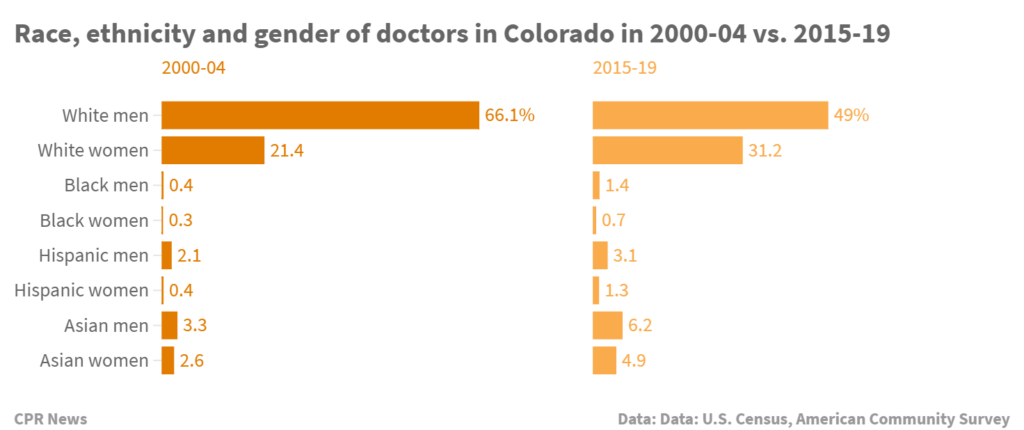
Richardson is emphatic that healthcare systems need to do more -- and the disparities of the pandemic have shown why.
“You have to do the work because sometimes people want to say, ‘Oh yeah, we want to diversify, but we can't find anybody.’ Well, this requires work,” Richardson said.
One of the ways Richardson has worked to make a difference was the creation a decade ago of the Colorado Black Health Collaborative, an advocacy group dedicated to health equity.
“We’re losing a champion,” said Cerise Hunt, a co-founder of the CBHC. “When any health issue comes up, I would ask Terry like, ‘what's going on with COVID, what's the real truth behind it?’
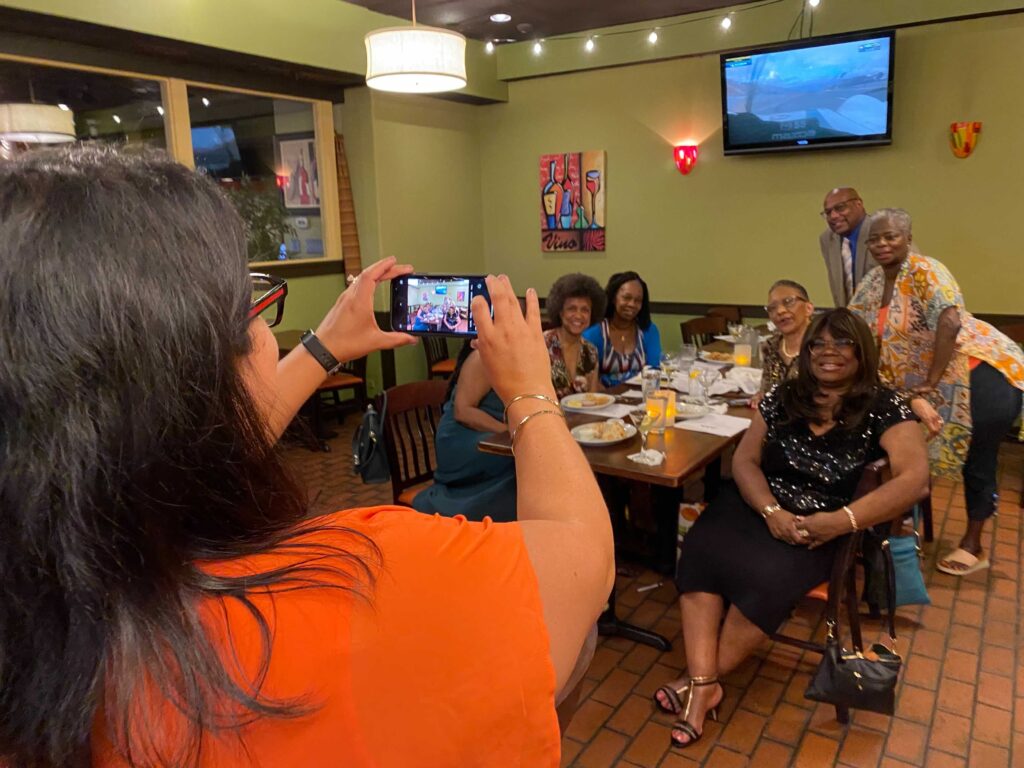
“She's such a pioneer and a beacon for truth and she truly had a love for community,” said Hunt, an associate dean for equity, diversity and inclusion at the Colorado School of Public health at the University of Colorado Anschutz medical campus.
But with her departure from her primary care practice, “she left a big void,” said colleague Daniel Onyema, a call center supervisor at Kaiser. He’s from Nigeria and worked with Richardson there for more than a decade. He said Richardson was a go-to for mentoring staff and students. “I'm going to miss her very much. Well, I got her number, so I'm going to get hold of her anytime, because my daughter wants to be a medical doctor. So I've already told her she's going to mentor her,” Onyema said. “And she agreed.”
Onyema says she’s been a role model for many doctors, nurses, other hospital staff, even patients, who Richardson admits have pleaded with her to stay, saying “‘What are we gonna do?’ I saw them at the Black Arts Festival. ‘We don't have a doctor!’ I was like, ‘you know what? You're going to have to learn a little bit more on self-advocacy.’``
Richardson’s colleague and chair at the Colorado Black Health Collaborative, Thelma Craig, said the pandemic, along with the chronic shortage of Black physicians, spotlights the need for the non-profit to expand its efforts. Craig said the CBHC was looking to raise funds and add an executive director.
“I think with (Richardson’s) retirement, we're going to be able to do more,” said Craig, who had a 30-year career in public health. “We have the track record to show that we're ready to take ourselves to a different level.”
As for her legacy, Richardson isn’t worried about that.
“I'm just here to do what I'm supposed to do. And I feel like I was, I was led to medicine for a purpose,” she said. “I just tried to do the best that I could, you know, to help people.”
Denverite’s Kevin Beaty contributed to this report.









